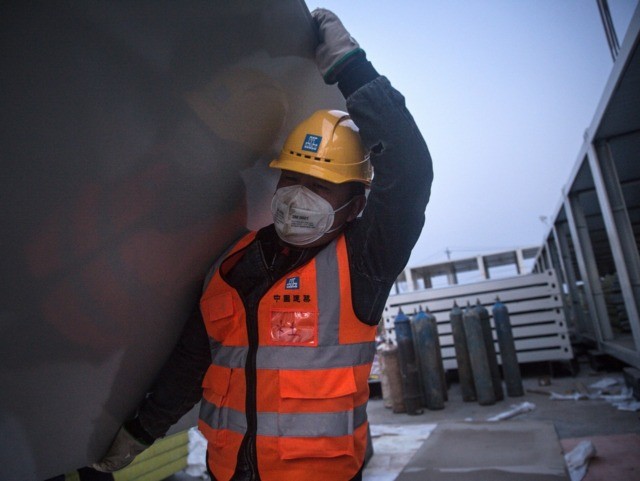Locals in Chinese provinces bordering Hubei, where a never-before-seen deadly virus originated last month, have reportedly built walls and roadblocks to prevent travelers from entering their communities, multiple reports revealed on Monday and Tuesday.
Chinese villagers imposing unofficial travel restrictions on their communities belies growing distrust in the Communist Party to properly protect citizens from the spread of the virus, considered highly contagious but whose existence the Chinese government only admitted in late January.
Chinese authorities announced on January 20 that they had identified a new form of coronavirus – in the same family as the virus responsible for the Sudden Acute Respiratory Syndrome (SARS) outbreak that killed nearly 800 people in 2003 – originating in Wuhan, the capital of Hubei province. Authorities believe the virus jumped from animal to human at a wild game and seafood market in the city, which they reportedly shut down on January 1, but failed to make concerns about the virus officially public at the time. The weekend before announcing they had discovered a new virus, Wuhan officials organized a massive banquet for 130,000 people in which homemade dishes made the table rounds, creating a high-risk atmosphere for infection.
Wuhan Mayor Zhou Xianwang estimated on Sunday that nearly half the city’s population, about 5 million people, left the city before he imposed travel restrictions. Zhou offered to resign for his poor handling of the crisis.
Radio Free Asia (RFA) identified several locations on Monday where Chinese citizens have taken it upon themselves to build brick and concrete walls to isolate themselves from potential virus carriers. RFA cited a local journalist identified only as “Li” who said that non-government roadblocks and walls were surfacing “along the entire length of the border between Hunan and Hubei, as well as along the border between Hubei and Henan.” Locals are identifying areas that may be particularly sensitive to people sneaking in, where multiple county lines meet and the local governments may assume the others are monitoring it, leaving it unattended.
Other unidentified sources in Hubei said that, rather than building walls, some locals are digging up roads into and out of towns to make them unusable.
One local in Jiangxi province, which borders Hubei, RFA did identify as Zhang Maolin, and he painted a dreary picture of life in the regions near Hubei.
“Each province is isolating itself … and civilian drivers daren’t go anywhere. Anyone who is trying to run a business isn’t going to be able to operate,” Zhang reportedly told RFA. “The key now is to re-open the flow of materials, because prices are very high right now in Wuhan because the goods can’t get in. Here in my town, there was no rice available yesterday, although there was some today.”
Outside of eyewitness statements, RFA noted that videos are surfacing on social media in China of locals refusing to allow people to enter their towns. Many of those turned away are among the 5 million who left Wuhan before the Communist Party placed the city on lockdown. Those not stopped at the entries to villages have found themselves unable to find a hotel willing to take them and cannot buy meals at restaurants.
Communist Party officials refused to comment to RFA.
The U.K.’s Sky News similarly reported on makeshift roadblocks and locals banding together to work to contain the spread of the coronavirus.
Sky News’ report begins in Hebei province, nearly 600 miles from Hubei, where the virus originated. There, reporters found six roadblocks manned by civilians.
“Handwritten signs at street entrances say: ‘No outsiders allowed in,'” the network reported. “Others have taken it further: at Xikangzhuang village, in Baoding, they have built entire walls out of brick.”
Even within Beijing, the nation’s capital, Reuters found locals organizing barriers to prevent outsiders from entering.
“Red tape was tied across the road at the entrance to the small community Monday. Village committee members wearing face masks and high-visibility vests manned the blockade,” Reuters described, visiting Beijing’s Shunyi district. One villager noted that, given local farming and bountiful food, “there’s no need for us to go outside.”
In more urban areas of Beijing, rather than organizing blockades to keep people out, locals are urging espionage and monitoring of anyone suspected of coming from outside.
“It’s our responsibility to find everyone and enforce safety … No one should be afraid to be an informant,” Chen Gang, a central Beijing local, told Reuters.
As of Tuesday, the official Chinese and World Health Organization (WHO) tallies state that health officials have identified 4,682 cases of the new coronavirus worldwide, the vast majority of those in China. Another 106 people have died from viral illness, all of them also within China, and most in Wuhan. Most international cases have been documented in Asia, though Germany, the United States, and Italy have identified travelers carrying the virus.
“We have full confidence that we can get it under control soon,” Chinese Foreign Ministry spokeswoman Hua Chunying told reporters on Monday, in response to well-wishing from Iranian Foreign Minister Mohammad Javad Zarif.
Follow Frances Martel on Facebook and Twitter.

COMMENTS
Please let us know if you're having issues with commenting.